7 Best Fivetran Alternatives for 2026
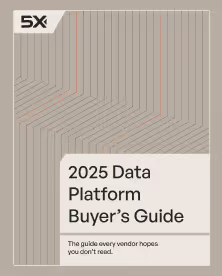
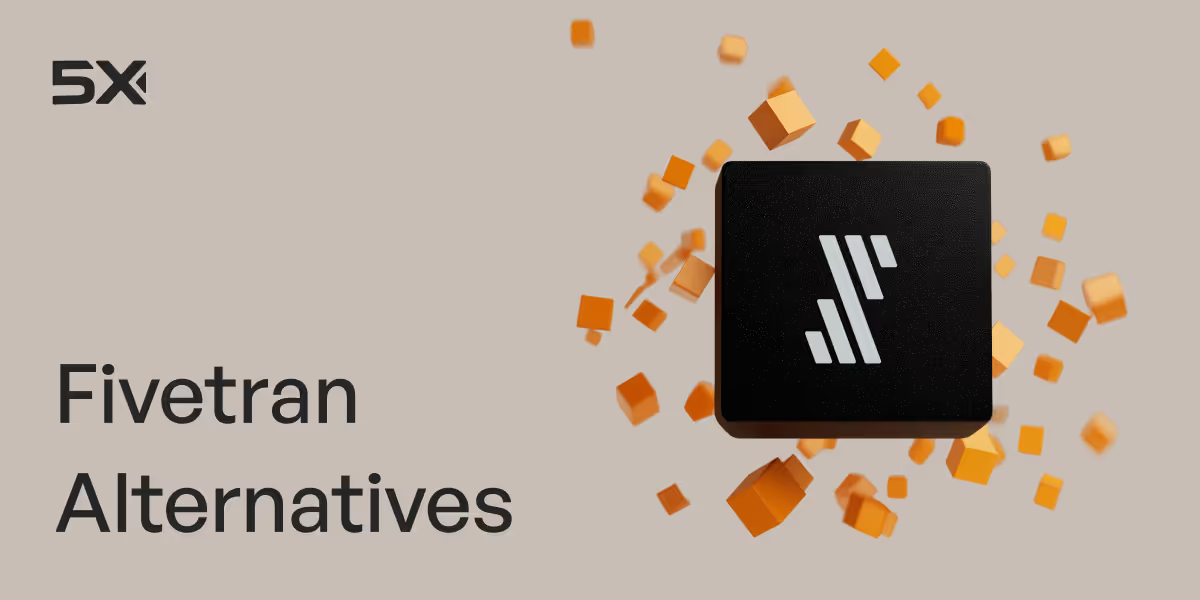
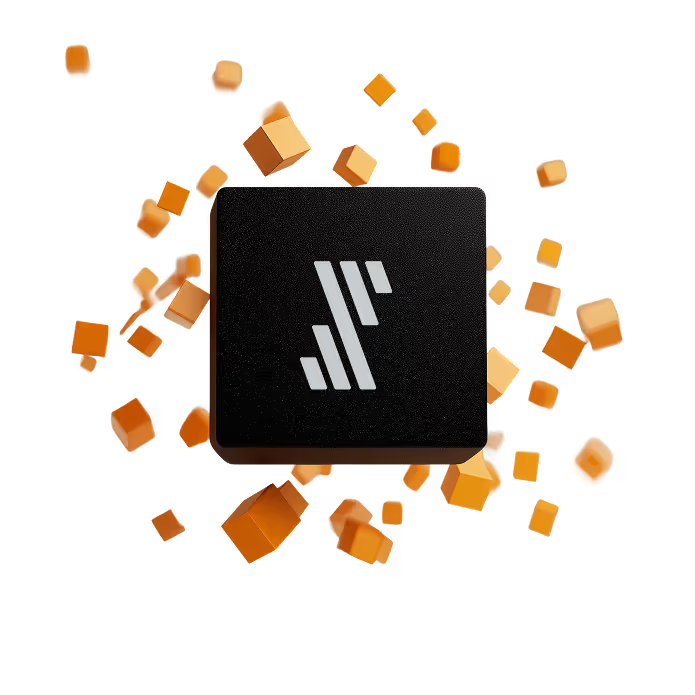
Table of Contents
TL; DR
You're here because Fivetran's pricing is giving you nightmares. Or their connectors don't play nice with your data sources. Maybe their support team treats you like ticket #47,392 instead of a human being with real problems.
You're not alone.
With Fivetran's March 2026 pricing changes shifting from account-level to connection-level Monthly Active Row (MAR) calculations, many teams are scrambling to find alternatives that won't bankrupt their data budgets.
The truth is simple: one size never fits all in data integration. What works for a Fortune 500 company might crush a startup's budget, and what satisfies a basic ETL need might leave data engineers pulling their hair out.
Here's what you need to know about the alternatives that matter.
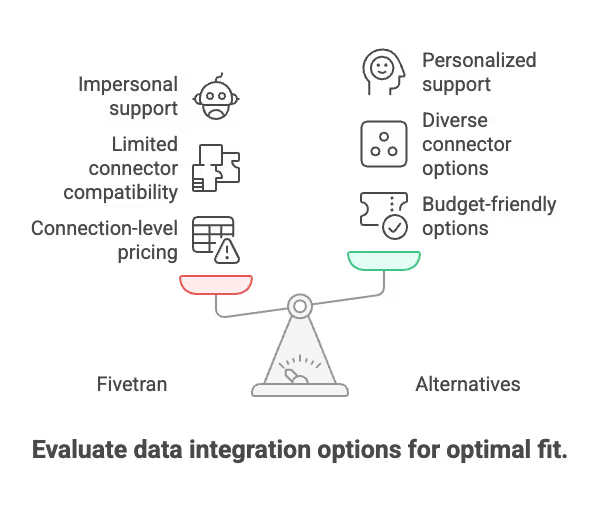
Why teams don’t like Fivetran
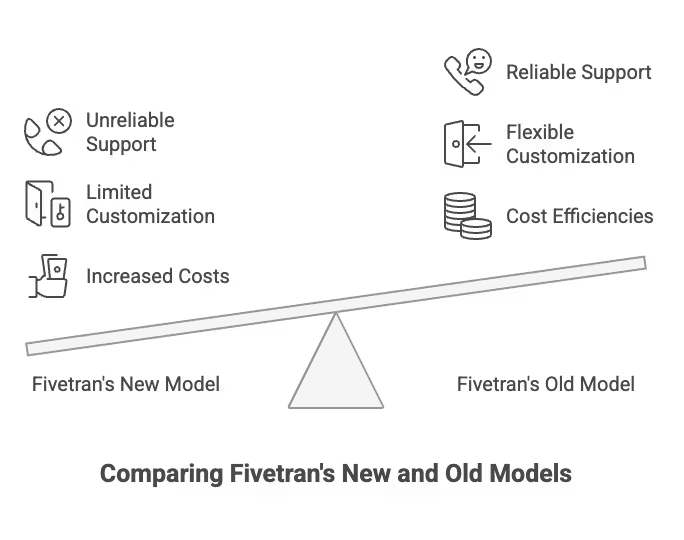
The reasons are predictable. And expensive.
1 . Pricing that spirals out of control
Under Fivetran's new model, MAR is counted per connector, not per account, removing previous cost efficiencies when bulk discounts were applied across all connectors. Teams report cost increases ranging from 30% to 200% after the March 2026 changes.
One user on G2 put it bluntly: "Single tables can get shockingly expensive. Where 95% of our cost for a database is coming from the messages tables."
2 . Limited customization options
Fivetran's pre-built connectors work great until they don't. Need a custom data source? Good luck. Their rigid architecture leaves little room for the unique requirements that every growing business eventually faces.
3. Support that doesn't support
Users report: "I have been through three account managers. My current manager tricked me into an annual contract by promising discounts that were never applied."
4. Missing connectors for long-tail sources
Fivetran focuses on "the most popular enterprise data connectors" while leaving smaller, niche applications unsupported. If your data is stored in specialised tools, you may face difficulties.
The real cost of staying put
Talk numbers. Others charge $450/month for 250 GB of data per month with 2 ports, while Fivetran charges $10,199/month.
Not a typo. A 2,166% difference.
Its workloads expand the gap. MAR counts are calculated for each real-time pipeline event, making Fivetran costly for event-based data sources.
7 Best Fivetran alternatives for 2026
1. 5X: The AI-ready data platform
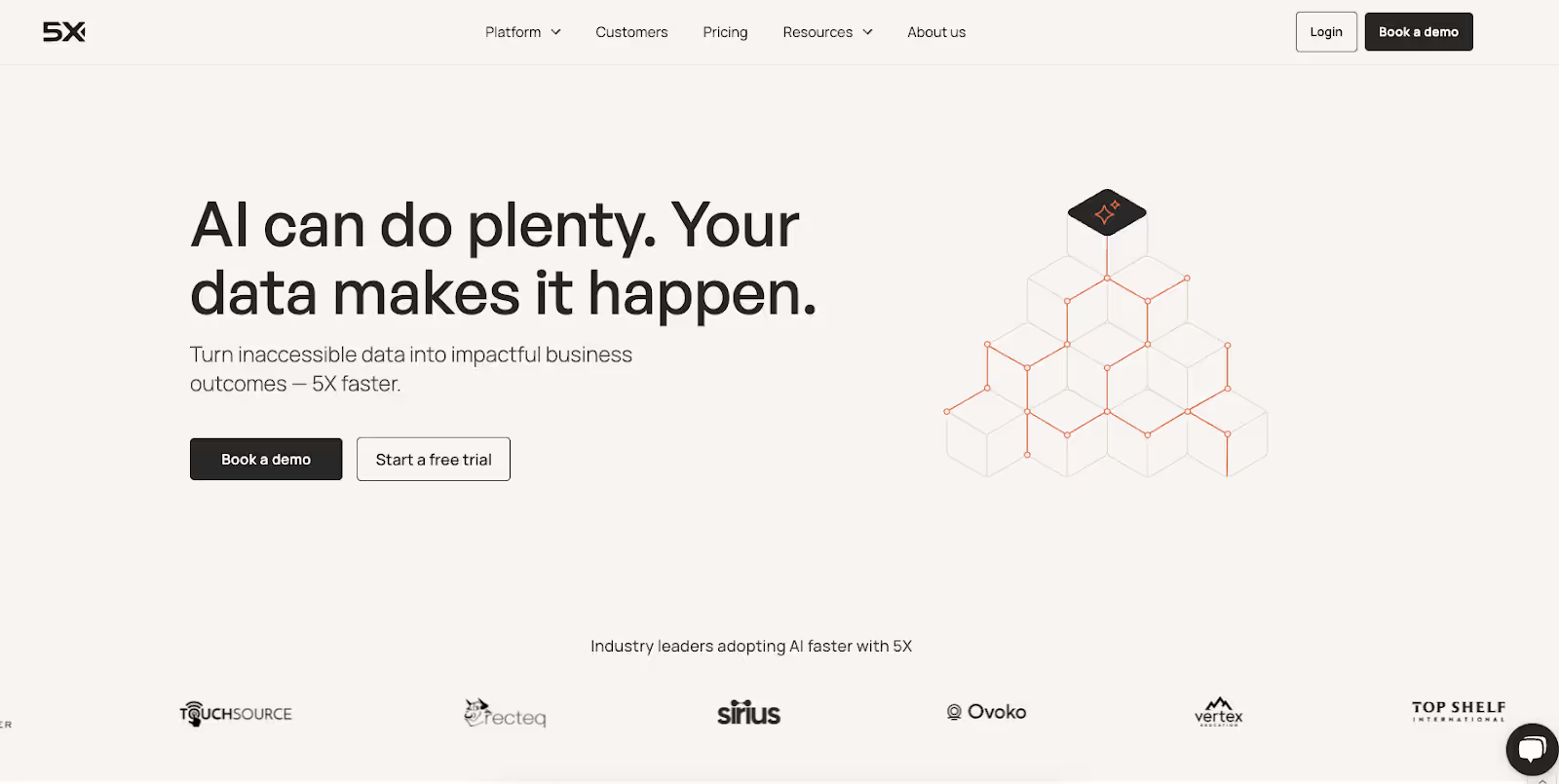
5X doesn't just move data; it transforms businesses into AI-powered organizations.
Founded by engineers who built data platforms at hypergrowth companies like WeWork and Uber, 5X addresses a critical problem: 80-90% of enterprise data remains "dark" and unusable. While other platforms focus on traditional ETL, 5X builds the foundation for AI applications and advanced analytics.
What sets 5X apart is its promise to deliver your first AI-powered use case in 48 hours. We don't just provide tools; we act as your data team, implementing end-to-end solutions with hands-on support.
Key features:
- 500+ pre-built connectors with custom connector development
- AI-ready data preparation and transformation capabilities
- End-to-end data platform including warehousing and BI integration
- Enterprise-grade security (SOC 2, GDPR, HIPAA compliance)
- Real-time data processing with automated orchestration
- Built-in support for major cloud data warehouses (Snowflake, Redshift, BigQuery)
- Integrated BI tools (Power BI, Tableau, Looker, Sigma)
- Hands-on implementation and consulting services
Pricing:
- Free first use case: 48-hour implementation at no cost
- Business solutions: Custom pricing based on data volume and requirements
- Enterprise deployments: Tailored pricing for cloud deployment in your environment
- Consulting services: Implementation and ongoing support packages available
Pros:
- Complete end-to-end data platform eliminating vendor sprawl
- AI-ready architecture designed for modern use cases
- The hands-on implementation team acts as your data department.
- Fast time-to-value with 48-hour proof-of-concept delivery
- Enterprise-grade security and compliance built in
- Weekly feature releases and continuous platform improvements
- Flexible deployment options (your cloud environment)
Cons:
- Custom pricing may be expensive for smaller businesses.
- The platform is relatively new, having been founded in 2021, and it has a limited track record.
- Requires commitment to their full-stack approach vs point solutions
- It may be overkill for simple ETL-only requirements.
- Limited public pricing information requires sales engagement.
- Best for: Growing businesses ready to build AI-powered applications on top of a unified data infrastructure.
Best for: Growing businesses with a lean or no data team, ready to build AI-powered applications on top of a unified data infrastructure.
2. Hevo Data: The user-friendly champion
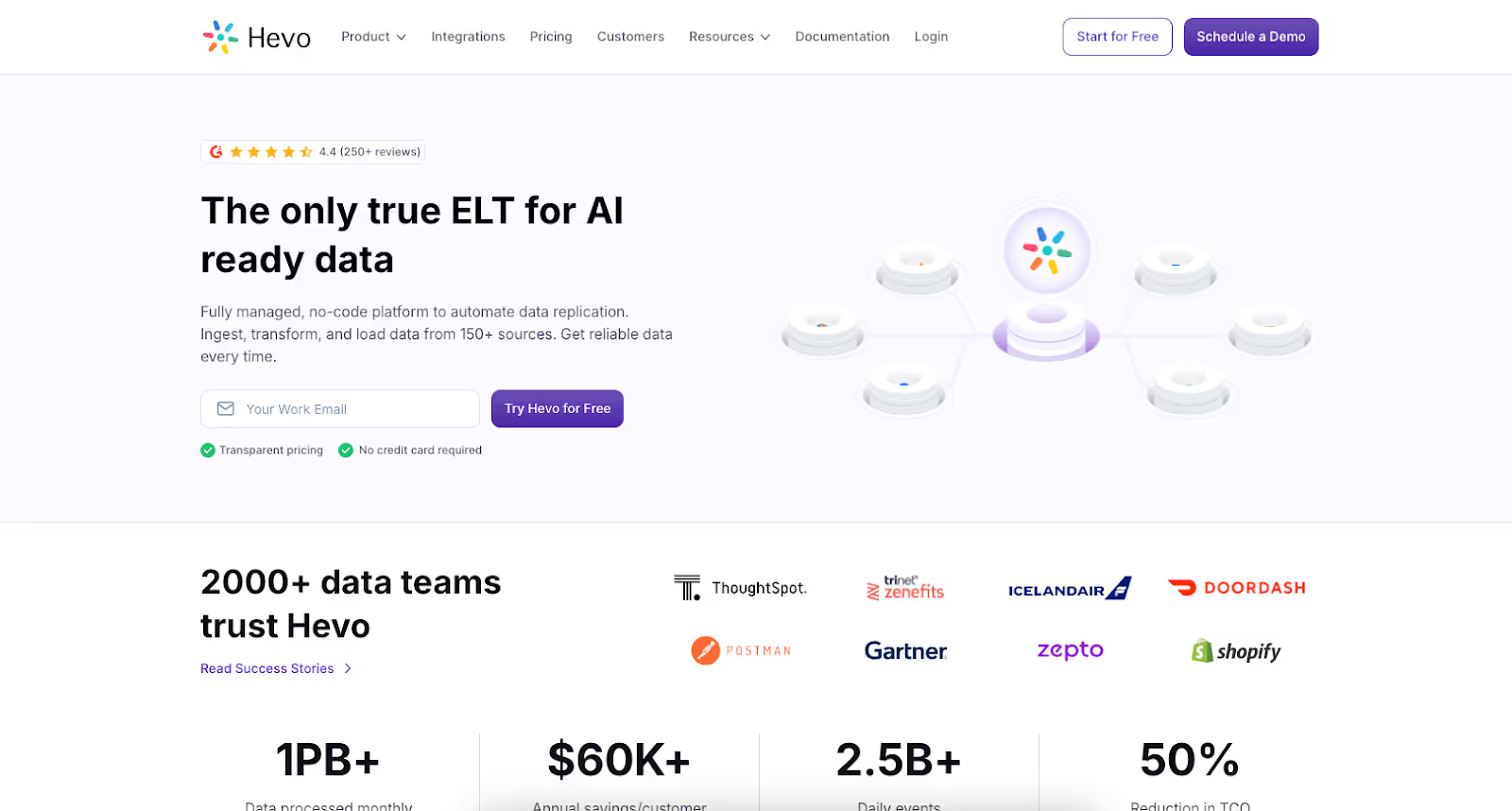
Hevo Data positions itself as the anti-Fivetran. Where Fivetran gets complex and expensive, Hevo stays simple and affordable.
Built specifically for teams tired of wrestling with complicated ETL tools, Hevo offers a no-code approach that doesn't sacrifice power. Their drag-and-drop interface means your business analysts can build pipelines without bothering the engineering team.
Key features:
- 150+ pre-built connectors with automatic schema management
- No-code drag-and-drop interface with Python scripting support
- Real-time data pipelines with 24×7 dedicated support
- Advanced transformations with dbt integration
- SOC 2 Type II, HIPAA, and GDPR compliance
Pricing:
- Free: Up to 1M events/month, limited connectors, up to 5 users
- Starter: Starting at $239/month for 5M events, all connectors, and up to 10 users
- Professional: Starting at $679/month for 20M events, unlimited users
- Business Critical: Custom pricing for 100 M++ events
Pros:
- User-friendly drag-and-drop interface
- Transparent and affordable pricing with no hidden fees
- We offer 24/7 dedicated support with a six-hour service level agreement (SLA).
- Extensive documentation and quick setup
- Free historical load for new connectors
Cons:
- No on-premise hosting options
- There are fewer connectors available compared to Fivetran, although custom connectors can be requested.
- Limited advanced governance features
Best for: Teams that want powerful ETL without complexity and predictable costs.
3. Airbyte: The open-source powerhouse
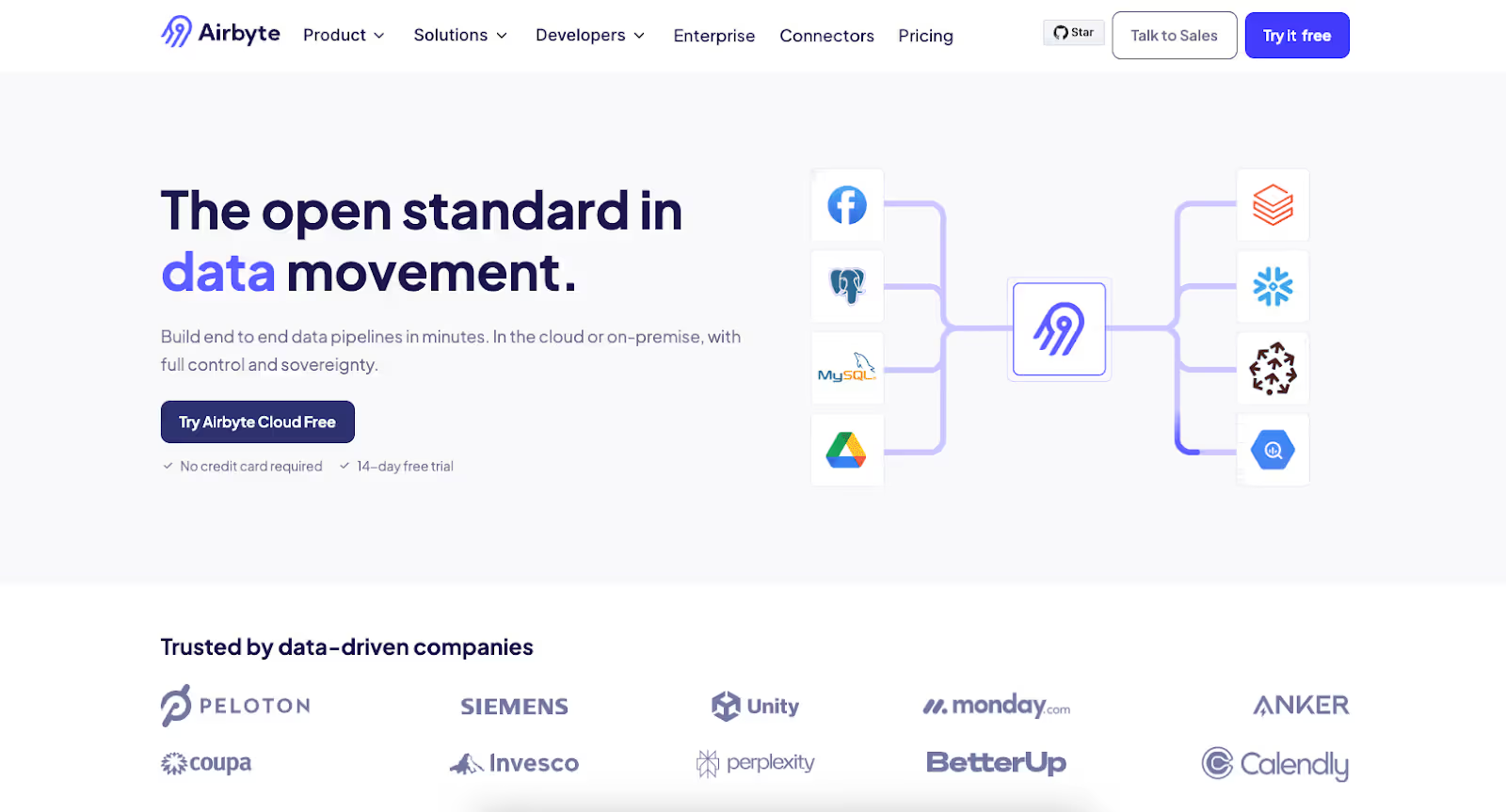
Airbyte didn't just enter the data integration space; it disrupted it.
Starting as an open-source project in 2020, Airbyte has grown into the largest data engineering community, with over 230,000 members. Their mission is simple: make data integration a commodity that everyone can afford and customise.
What makes Airbyte different is its commitment to transparency. Every connector, every feature, every line of code is open for inspection. No black boxes. No vendor lock-in. If you don't like how something works, you can change it.
Key features:
- 600+ connectors (open source) / 550+ connectors (cloud)
- Open-source with custom connector development through CDK
- Multiple deployment options (self-hosted, cloud, hybrid)
- Real-time streaming capabilities with sub-5-minute frequency
- AI-powered connector builders and transformation tools
Pricing:
- Open Source: Free forever (self-hosted)
- Cloud: Volume-based pricing starting at $2.50/credit (1M rows = 6 credits)
- Teams: Capacity-based pricing (new model, contact for pricing)
- Enterprise: Capacity-based pricing with custom features
Pros:
- Completely open-source with no vendor lock-in
- Largest connector library with active community contributions
- Highly customisable with full code access.
- Cost-effective for small-scale implementations
- Strong developer community support
Cons:
- Steep learning curve requiring technical expertise
- Maintenance overhead in the self-hosted model
- Credit-based pricing can be unpredictable for the cloud version.
- Limited enterprise-grade support in the free tier
Best for: Technical teams comfortable with infrastructure management and custom development.
4. Matillion: The cloud transformation specialist
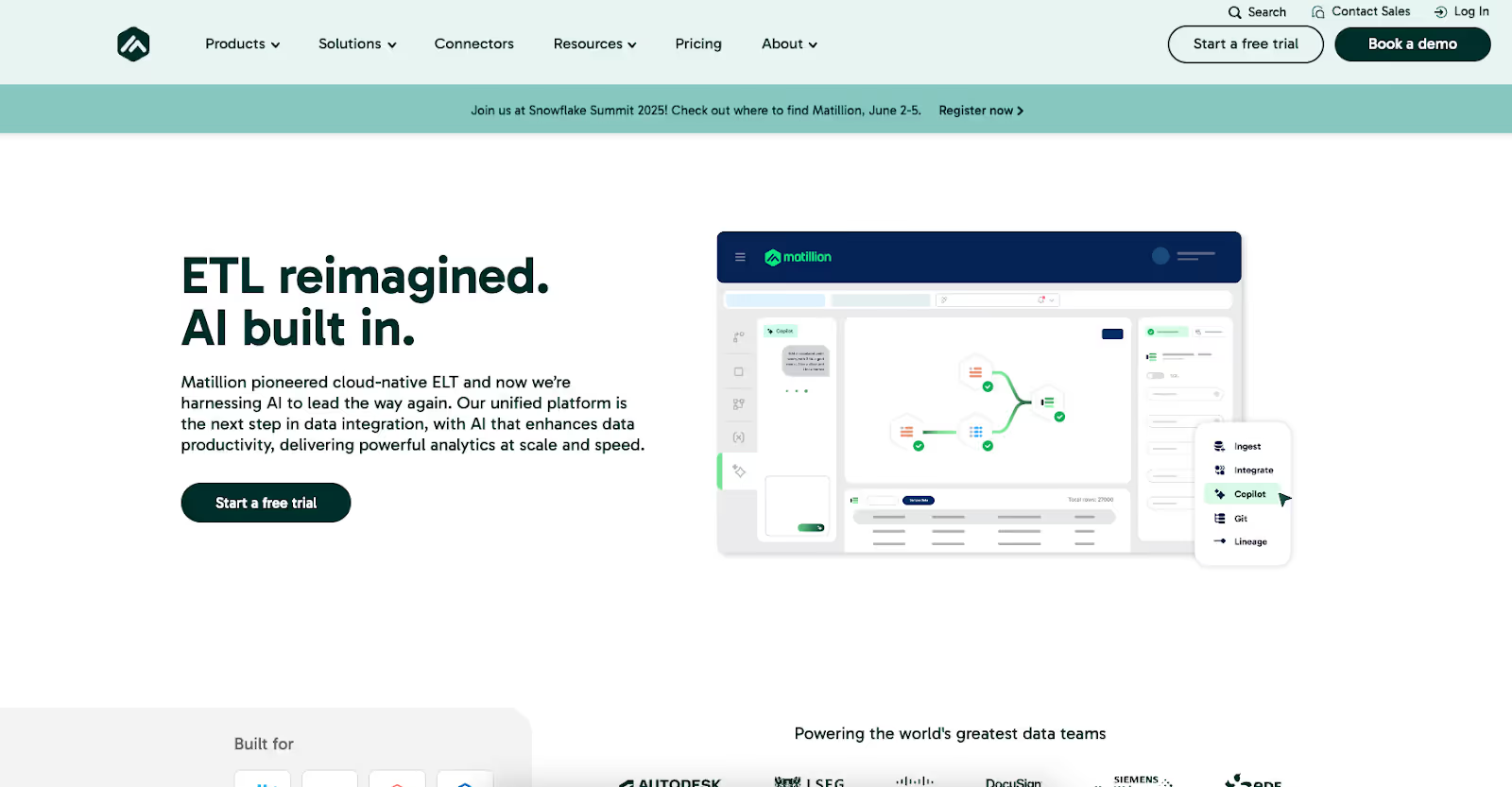
Matillion bet everything on the cloud when everyone else was still talking about on-premises solutions. That early vision paid off.
Founded in 2011, Matillion built its platform specifically for cloud data warehouses like Snowflake, BigQuery, and Redshift. They don't try to be everything to everyone; they focus on doing cloud transformation exceptionally well.
Their secret weapon is pushdown optimization. Instead of processing data on their servers, Matillion pushes transformations directly to your data warehouse, leveraging the massive computing power you're already paying for. This approach delivers faster performance and lower costs.
Key features:
- 110+ pre-built connectors with a visual ETL/ELT builder
- Pushdown optimization leveraging cloud data warehouse processing power
- Native AI integrations with built-in copilot
- Advanced transformation capabilities with Python and SQL support
- Multi-cloud support (AWS, Azure, Google Cloud)
Pricing:
- Developer: Free tier with limited features
- Basic: $2.00/credit (500 monthly credits included)
- Advanced: $2.50/credit (750 monthly credits included)
- Enterprise: $2.70/credit (1000 monthly credits included)
Note: Each credit provides 15 minutes of pipeline execution, meaning 1 task hour = 4 credits. Task hours are only charged when running a pipeline.
Pros:
- Intuitive visual designer for low-code pipelines
- Optimised for fast data loading and complex workflows.
- Deep integration with major cloud data warehouses
- Built-in AI copilot for transformation assistance
- Strong performance with pushdown optimization
Cons:
- Credit-based pricing can become expensive at scale.
- Advanced features require knowledge of SQL and Python.
- Limited customisation compared to open-source alternatives
- The annual price increases every November 1st
Best for: Cloud-focused enterprises needing advanced transformation capabilities.
5. Stitch: The budget-conscious choice
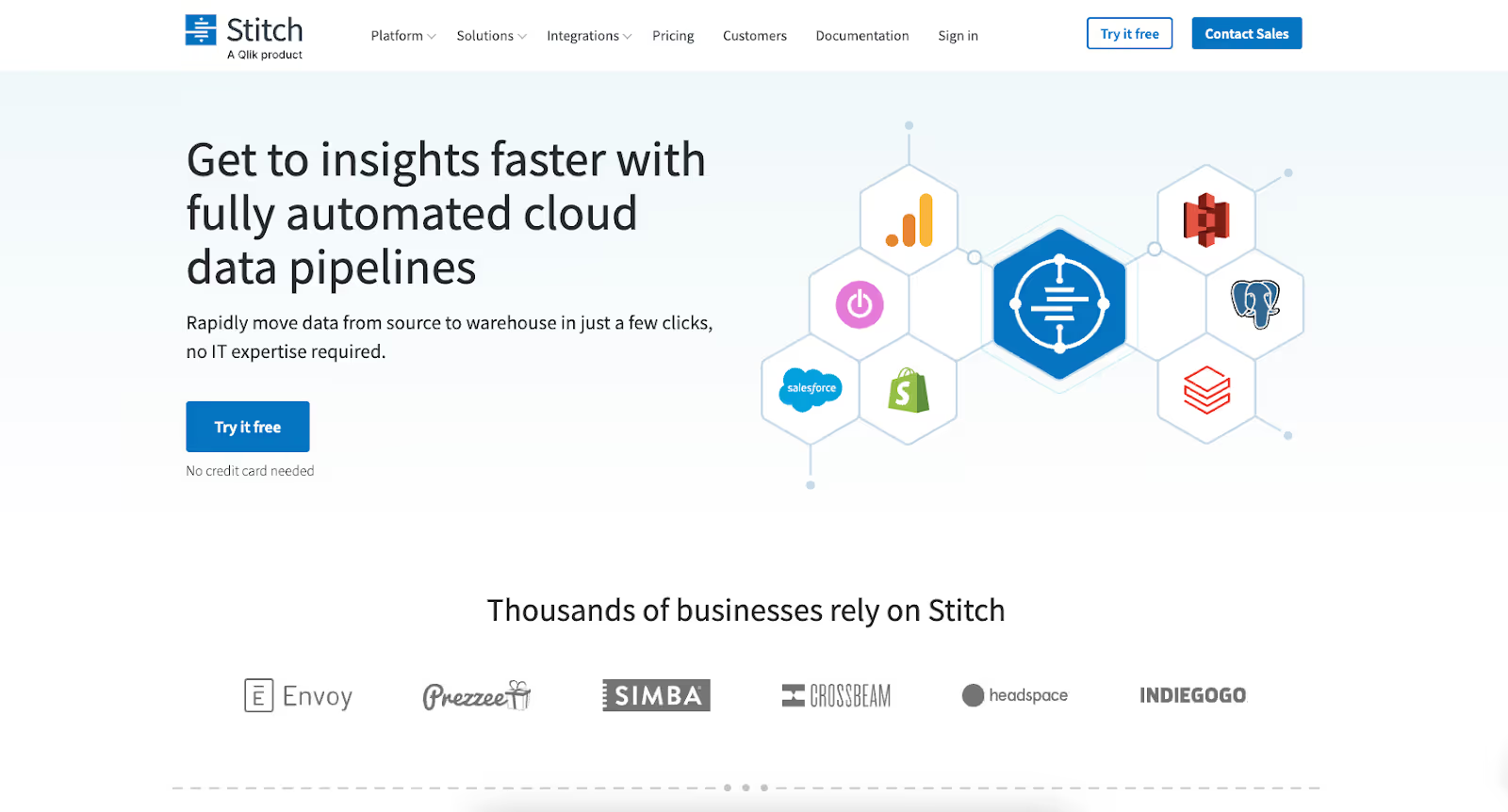
Stitch knows exactly what it is: the affordable alternative for teams with straightforward needs.
Originally built by Talend (now owned by Qlik), Stitch focuses on doing the basics well. No fancy AI features. No complex orchestration. Just reliable data replication from point A to point B at a price that won't make your CFO faint.
Starting at $100/month, Stitch costs less than most teams spend on coffee. Their philosophy is simple: if you need advanced features, there are other tools for that. If you need reliable, affordable ETL for common data sources, Stitch has you covered.
Key features:
- 130+ data source connectors with Singer protocol integration
- Simple setup process with transparent pricing
- Automated data replication with incremental updates
- Integration with the Talend suite of tools
- Support for nested JSON transformations
Pricing:
- Standard: $100/month (5-30M monthly rows, 1 destination, 10 sources)
- Advanced: $1,250/month (100M rows, 3 destinations)
- Premium: $2,500/month (1B rows, 5 destinations)
Pros:
- Most affordable entry point among major competitors
- Simple interface with quick onboarding
- Reliable data syncs with minimal downtime.
- Good for common data sources with straightforward needs
- 14-day free trial available
Cons:
- Poor customer support (email only for the standard plan)
- Limited connector library compared to competitors
- Singer connectors can break without warning.
- It is not optimised for high data volumes.
- Limited advanced transformation capabilities
Best for: Small to medium teams using mainstream data sources with basic ETL needs.
6. Portable: The long-tail specialist
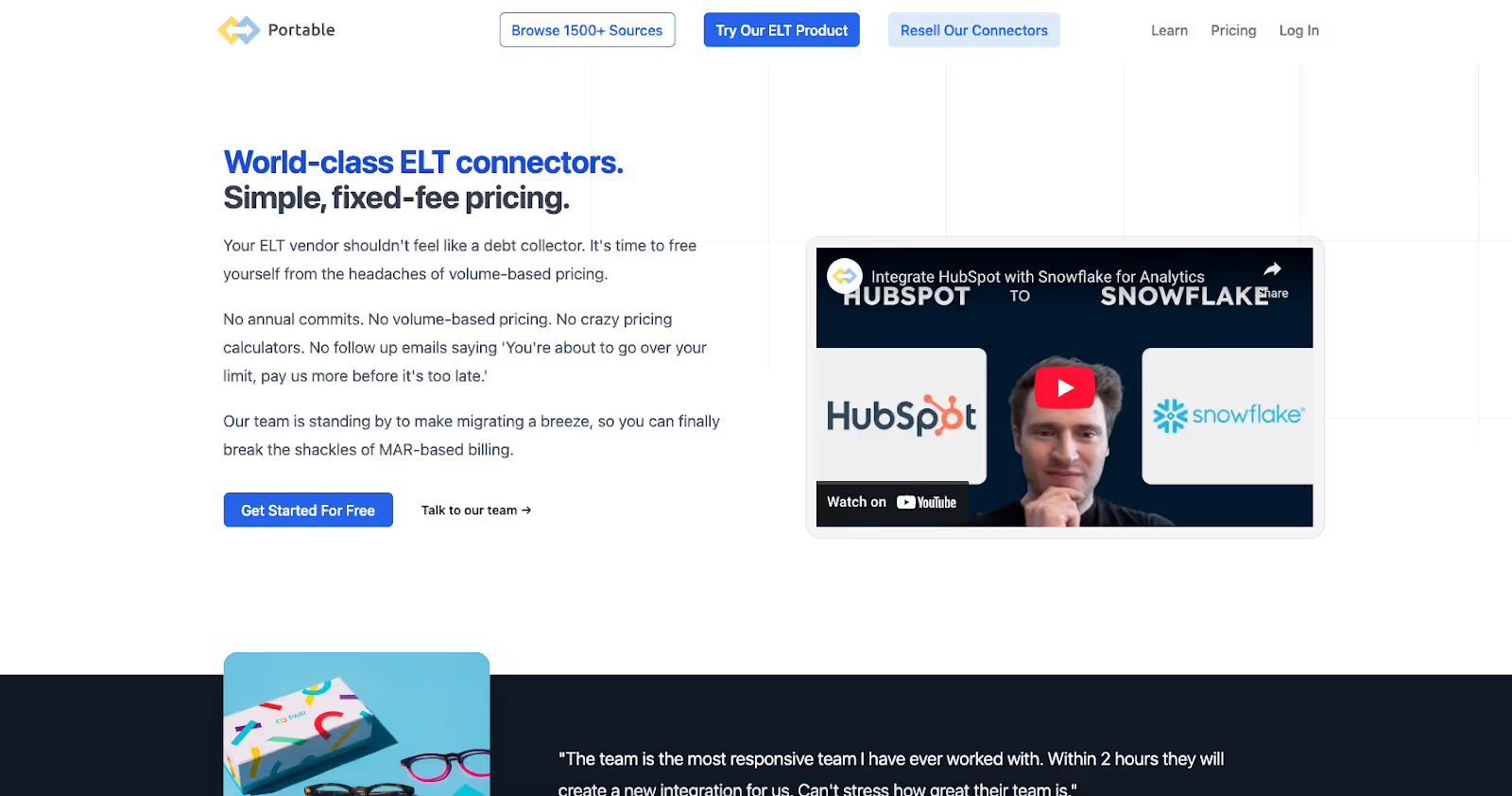
Portable exists because Fivetran doesn't. While major ETL platforms focus on Fortune 500 data sources, thousands of businesses rely on niche applications that the big players ignore. Portables built their entire business model around these "long-tail" connectors.
Their value proposition is refreshingly simple: if you need a connector, they'll build it. For free. And maintain it. Forever.
This isn't marketing fluff. Portable has 250+ connectors that other platforms don't support, from industry-specific software to regional applications. When a customer requests a new connector, Portable's team typically delivers it within days or even hours.
Key features:
- 250+ connectors focusing on long-tail applications
- Custom connector development and maintenance at no extra cost
- No-code/low-code interface for non-technical users
- Unlimited data sources, destinations, and volumes
- Hands-on customer support
Pricing:
- Manual: Free for unlimited data with manual sync
- Scheduled: $200/data flow with unlimited sources and volumes
- Custom: Tailored pricing for specific needs
Pros:
- It provides support for more than 250 long-tail connectors, a feature that other companies do not provide.
- Custom connectors built and maintained for free
- Transparent, simple pricing with unlimited data
- Quick connector development (days or hours)
- Excellent hands-on customer support
Cons:
- The largest enterprise sources are not supported. (Salesforce, QuickBooks)
- Limited focus on databases as sources
- Not available internationally
- Smaller user community
Best for: Companies needing niche data connectors that major competitors don't support.
7. Rivery: The enterprise orchestrator
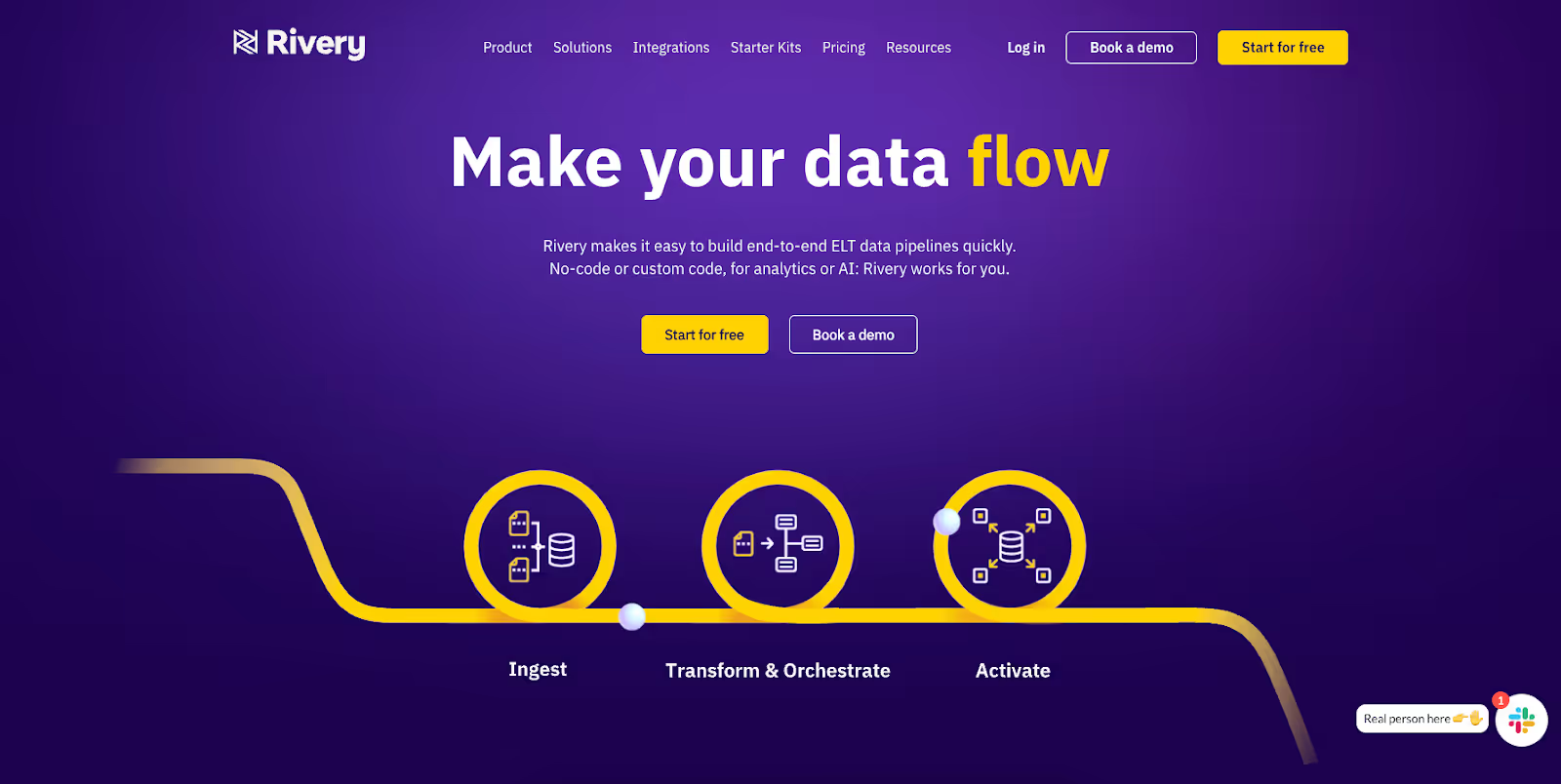
Rivery doesn't just move data; it orchestrates entire data ecosystems.
Built for enterprises with complex data workflows, Rivery goes beyond simple ETL. Their platform handles everything from basic data replication to sophisticated multi-step transformations with conditional logic and advanced scheduling.
What impresses users most is Rivery's approach to customer success. They maintain a 9.8/10 rating on G2 for support, which is almost unheard of in enterprise software. Their team doesn't just answer questions; they become strategic partners in your data transformation journey.
Key features:
- 200+ built-in connectors with custom API capabilities
- Advanced scheduling and conditional logic
- Reverse ETL and bidirectional sync capabilities
- Built-in data governance and lineage tracking
- 24/7 global support rated 9.8/10 on G2
Official pricing:
- Starter: $0.75/credit
- Professional: $1.20/credit
- Enterprise: Custom pricing
- Note: 1 credit = 1 API pipeline execution, 100 MB data replication, or 1 transformation execution.
Pros:
- Highly customised for complex data orchestration.
- Excellent customer support with fast response times
- Advanced transformation and scheduling capabilities
- Strong data governance features
- Flexible deployment options
Cons:
- Credit-based pricing can be complex to predict.
- Requires initial setup time for complex workflows
- It may be overkill for simple ETL needs.
- Higher learning curve than simpler alternatives
Best for: large organisations needing sophisticated data orchestration with enterprise-grade reliability.
Making the switch: What to consider first
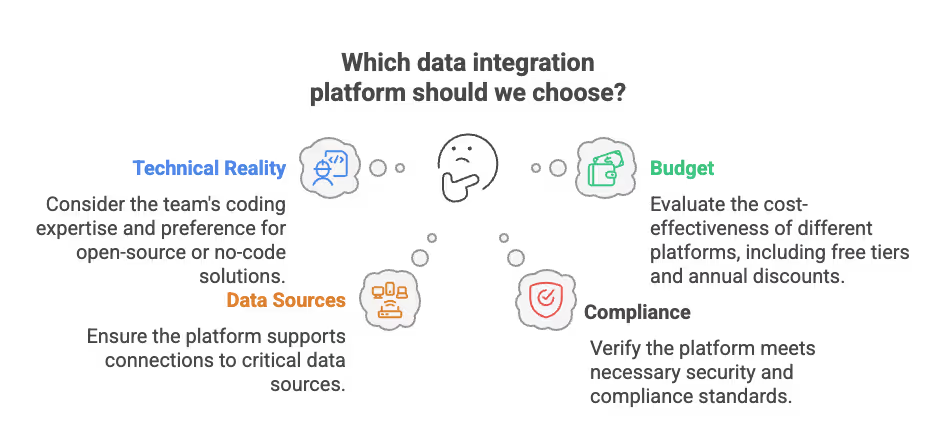
1. Your technical reality
Are you a team of data engineers who dream in Python? Airbyte or open-source solutions might be your jam.
Are you business analysts who break out in hives at the sight of code? Hevo Data or Stitch will treat you better.
2. Your wallet
Budget-conscious startups should look at Hevo Data's free tier or Stitch first.
Enterprise teams with complex needs might find Matillion or Rivery worth the investment.
Companies can secure a 5% discount by signing annual contracts with most providers, so factor that into your calculations.
3. Your data sources
Check connector availability first. There's no point in switching to a platform that can't connect to your critical systems.
For mainstream sources (Salesforce, Google Analytics, PostgreSQL), most alternatives work fine.
For niche applications, Portable or Airbyte's custom development might be your only options.
4. Your compliance requirements
Highly regulated industries need platforms with robust security features.
Look for SOC 2 Type II certification, GDPR compliance, and data encryption capabilities.
Conclusion / Stop using Fivetran here’s why?
Fivetran built an impressive platform. But their March 2026 pricing changes have pushed many teams over the edge.
The good news? Better alternatives exist for almost every use case.
While the alternatives above solve specific integration challenges, many teams are moving beyond point solutions to full-stack data platforms like 5X.
Rather than managing multiple vendors for ingestion, transformation, orchestration, and visualization, 5X provides an end-to-end solution that eliminates vendor sprawl and reduces total cost of ownership by up to 50%
Companies choose 5X because it delivers what Fivetran promises—but without the pricing surprises. You get automated data ingestion from 600+ sources, built-in transformation with dbt, intelligent orchestration, and business intelligence—all in one platform.
The key is matching the tool to your specific needs, not settling for what everyone else uses.
Your data pipeline should serve your business, not drain your budget. Choose accordingly.
Building a data platform doesn’t have to be hectic. Spending over four months and 20% dev time just to set up your data platform is ridiculous. Make 5X your data partner with faster setups, lower upfront costs, and 0% dev time. Let your data engineering team focus on actioning insights, not building infrastructure ;)
Book a free consultationHere are some next steps you can take:
- Want to see it in action? Request a free demo.
- Want more guidance on using Preset via 5X? Explore our Help Docs.
- Ready to consolidate your data pipeline? Chat with us now.

How retail leaders unlock hidden profits and 10% margins
Retailers are sitting on untapped profit opportunities—through pricing, inventory, and procurement. Find out how to uncover these hidden gains in our free webinar.
Save your spot






%201.svg)
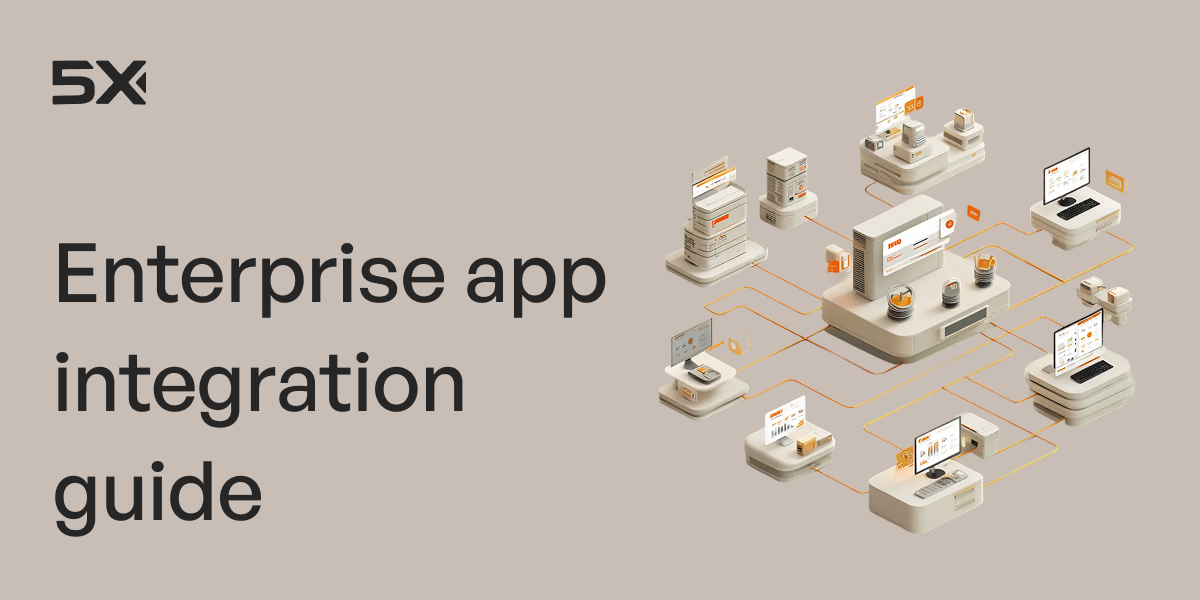
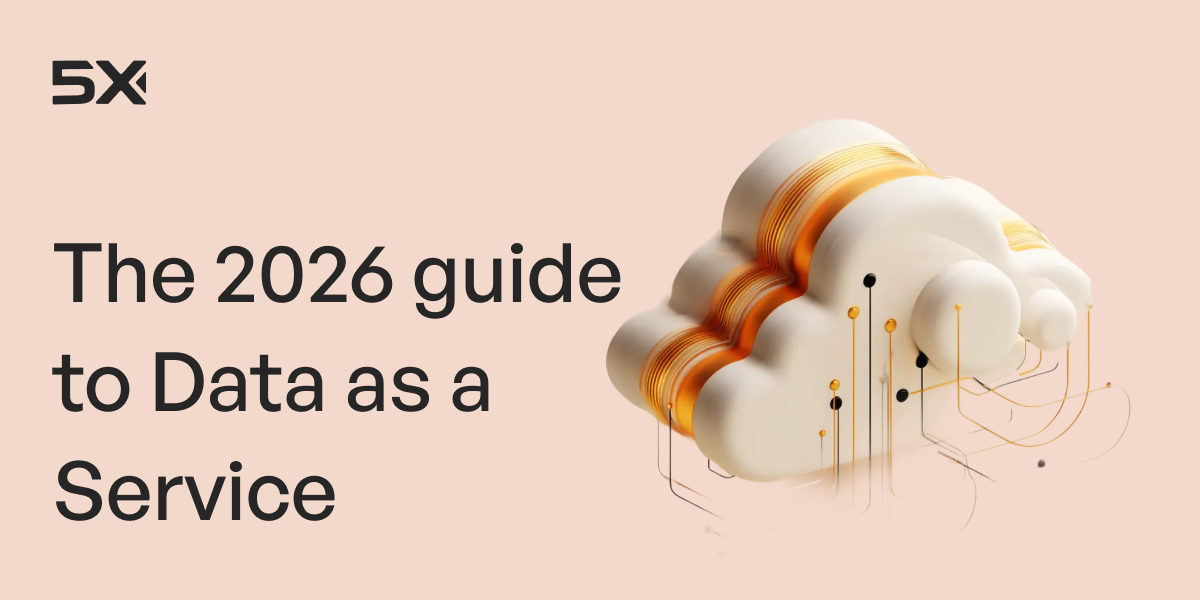
.png)






